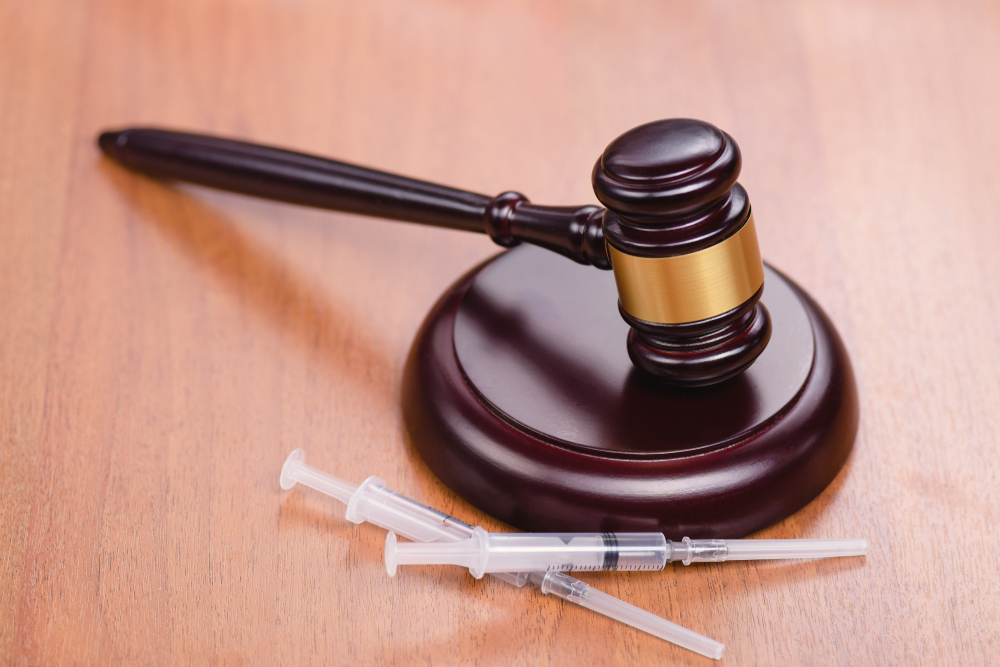Orange production contributes well over a billion dollars per year to Florida’s economy, but the state’s agricultural tradition goes beyond citrus. In fact, Florida ranks fourth for peanut production and first for fresh-market sweet corn.
Nearly 9.5 million acres of Florida land are devoted to agriculture, and thousands of jobs rely on this industry. Florida’s position as an agricultural leader is one of the reasons so many people in the state are becoming concerned about their potential exposure to a controversial weedkiller, “Roundup.”
First discovered by the equally controversial chemical company Monsanto, Roundup is the brand name of the herbicide glyphosate, and a growing body of legal and scientific evidence suggests that Roundup may cause cancer.
More than 100,000 lawsuits have been filed alleging that connection, and of the three that have been completed so far, all have ended in multimillion-dollar jury awards totaling more than $2 billion. In addition to those verdicts, settlement offers are being negotiated, both for cases that have already been filed and those to come.
Whether they work in agriculture or use Roundup to control weeds around their homes, Florida residents should know the risks of using this product, as well as what legal rights they may have to seek compensation if they used Roundup and were later diagnosed with cancer.
What Does Roundup Do?
Roundup’s active ingredient, glyphosate, was at one time a de-scaling chemical that was popular in the commercial plumbing industry thanks to how effectively it removed calcium buildup from boilers, pipes, and other equipment.
But in the 1970s, a Monsanto researcher discovered a new use for glyphosate, this time as a non-selective herbicide. Not long after the company introduced Roundup to the market in 1974, it became an enormously popular product in agriculture and for residential weed control. Today, Roundup remains the best-selling weedkiller in history.
Why is it that a chemical cleaning agent has become ubiquitous in farming and lawncare? Roundup’s effectiveness comes from the way it attacks plants, which is by blocking production of an enzyme plants require to live. Without production of this enzyme, plants quickly die. This biological process does not occur in humans, which is one reason why Roundup remains legal for use in the United States and why Monsanto and its parent company, Bayer, have consistently maintained that it is not dangerous.
One study estimated that more than 3.5 billion pounds of glyphosate have been used for agricultural, commercial, and residential uses in the U.S. since it was introduced, but agriculture remains Roundup’s biggest customer.
Florida is home to more than 47,000 farms and ranches, and while it does not produce many of the crops that are most connected to glyphosate, such as corn and soybeans, the state’s agricultural heritage still means that millions of pounds are used every year, according to the U.S. Geological Survey (USGS).
Glyphosate Use in Florida
- Since 1992, just under 84 million pounds of glyphosate have been applied to Florida farm fields and orchards.
- In 2017, the most recent year with available data, Florida ranked No. 26 in the nation in the amount of Roundup used, at about 2.2 million pounds.
- Glyphosate is the sixth most commonly used herbicide or pesticide in Florida agriculture.
- Orchard crops like oranges accounted for about 75% of the glyphosate used in Florida agriculture in 2017, while cotton added about 10%, and pasture hay accounted for another 6%.
- While Florida is not a national leader when it comes to production of corn or soybeans, which are commonly treated with glyphosate, the state is second only to California in orange production. Florida was expected to produce 57 million boxes of oranges in the 2020-21 growing season.
Is Roundup Dangerous?
The evidence is mounting that points to Roundup being too dangerous for anybody to use for any reason. From jury verdicts and court decisions to governmental action, many signs suggest Roundup is not safe for use:
- The three Roundup cancer cases that have gone to trial so far have ended with jury members deciding that the product does cause cancer and that those who used it and became sick are entitled to receive a combined $2 billion in damages. Each of the eye-popping jury verdicts have been reduced on appeal, but nothing has changed the juries’ determinations that Roundup is an unsafe product.
- Since 2015, a World Health Organization cancer agency has formally listed glyphosate as a probable carcinogen, meaning it is more likely than not that it causes cancer.
- In 2021, New York is poised to become the first state to ban glyphosate, thanks to a bill passed in 2020 that is expected to go into effect at the end of the year.
- California also formally considers glyphosate to be cancer-causing, and dozens of communities in the state have limited or outright banned use of Roundup. The state’s largest public university system, the University of California, has outlawed Roundup on the grounds of its many campuses.
- Countries like Mexico, Thailand, Luxembourg, and Vietnam have all banned glyphosate, and German lawmakers are considering phasing out its use in farming over the next few years.
Roundup and Non-Hodgkin Lymphoma (NHL)
What should Florida residents know about the specific health-related effects of using Roundup? All of the cases that have ended in verdicts in favor of plaintiffs, as well as the proposed settlements, deal with former Roundup users who were diagnosed with non-Hodgkin lymphoma, a form of cancer.
Here’s a look at the most common physical signs of this type of cancer:
- Chest pain
- Cough
- Chills
- Easy bruising
- Fatigue
- Fever
- Frequent, severe infections
- Night sweats
- Shortness of breath
- Swollen abdomen
- Swollen lymph nodes
- Weight loss
The American Cancer Society predicts that at least 82,000 people in the U.S. will be newly diagnosed with NHL this year, accounting for about 4% of all cancer cases. Sadly, the organization estimates that about 21,000 people annually will lose their lives to non-Hodgkin lymphoma.
Survival rates are highly tied to detection, and in the early stages, about 73% of patients can expect to live at least five more years. But if the cancer is not caught until it is spread, five-year survival rates are only 57%.
If you show any of the above symptoms and believe that you may have developed NHL as a result of exposure to Roundup, you should immediately seek medical treatment.
What Is the Current Status of Roundup Litigation?
State and local efforts notwithstanding, Roundup remains legal for use in the United States thanks largely to the determination by the U.S. Environmental Protection Agency (EPA) that it does not cause cancer. However, this was not always the agency’s position, and between about 1985 and 1992, the EPA listed glyphosate as a possible carcinogen, meaning there was evidence to suggest it had the potential to cause cancer.
Today, Roundup’s biggest hurdle remains in the courtroom or, more accurately, at the negotiation table. That is because after suffering three consecutive trial defeats in California, leadership at Bayer in 2020 decided to make a $10 billion settlement offer to end most of the 100,000 Roundup cancer cases pending. The company has also suggested that it would offer a $2 billion settlement for future cases that have yet to be filed.
Labelling Settlement
While those cases deal with people who used Roundup and were later diagnosed with cancer, there already has been an agreement reached to settle a class-action lawsuit over allegations that Roundup’s product labeling was misleading. That settlement, about $40 million, applies to Florida residents who bought Roundup after Feb. 13, 2015, who would not have purchased the product but for its label.
Bayer has pledged to change the label, which stated that because the enzyme necessary to allow glyphosate to kill plants does not exist in humans or pets that Roundup was only harmful to plants.
Negotiations over the cancer-related cases are ongoing.
How Much Can I Get From a Roundup Lawsuit in Florida?
Neither settlement offer has been approved, so it is tough to say how much a person might be able to expect if they were to file a Roundup lawsuit in Florida. However, in its proposal for the $10 billion settlement, Bayer did establish some guidelines that it proposes to use for determining how much to award each plaintiff.
While the average payout would be about $165,000, some victims could see those awards enhanced, while survivors of Roundup victims who have passed away would be expected to receive the highest sums.
Here is a look at some of the guidelines Bayer has proposed for distributing its cancer settlement money:
- The settlement offer applies to U.S. citizens who used Roundup for at least a year before being diagnosed with non-Hodgkin lymphoma.
- A person’s age at diagnosis and stage of advancement will be factors.
- Additional points will be awarded for survivors of those who have already died, with the most points going to surviving spouses or minor children.
What Should I Do if I Have Been Affected by Roundup?
If you are a Florida resident who has used Roundup as part of your job or to control weeds and vegetation around your property, you should consider stopping use of the weedkiller. Consult with your doctor if you have any of the symptoms outlined above.
And if you have been diagnosed with cancer after using Roundup, the best way to ensure you get the compensation you deserve is to consult with an expert Roundup class-action law firm in Florida. We can help connect you with a reputable firm in your area.
Many law firms and attorneys around Florida are well-versed in these cases, and it is typical for plaintiffs to pay legal fees only if they collect a judgment, verdict, or settlement. Plus, initial consultations are usually free and simple to schedule.





